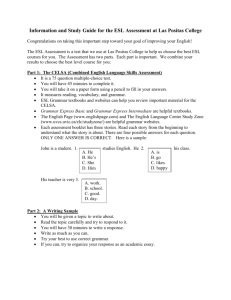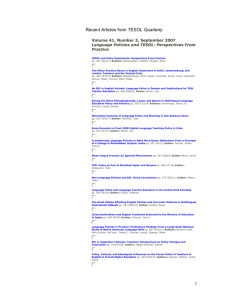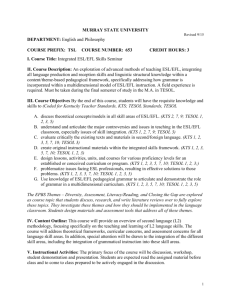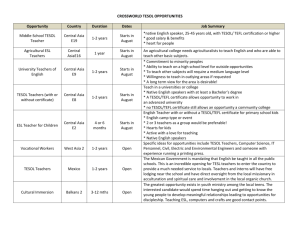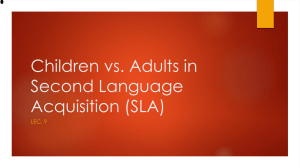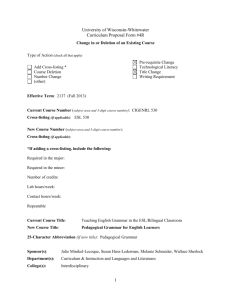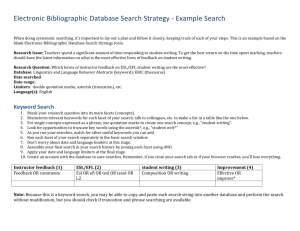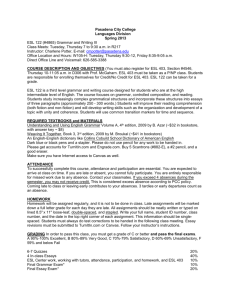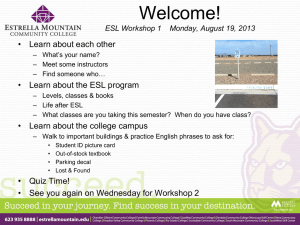Course Requirements and Grading Scale
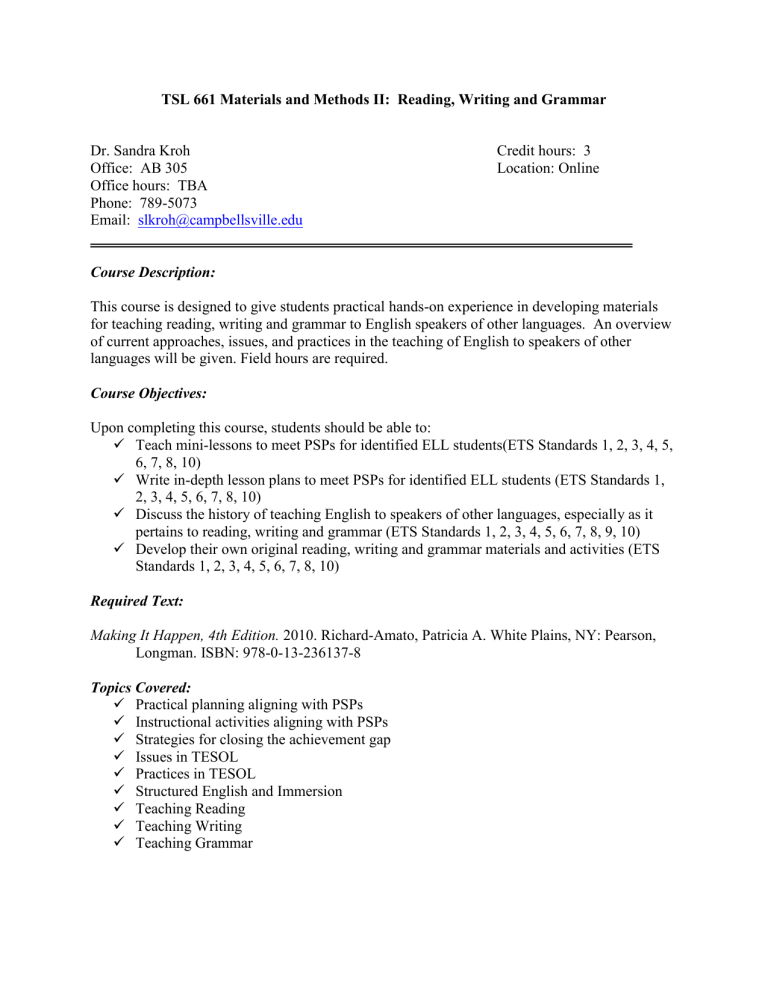
TSL 661 Materials and Methods II: Reading, Writing and Grammar
Dr. Sandra Kroh
Office: AB 305
Office hours: TBA
Phone: 789-5073
Email: slkroh@campbellsville.edu
Credit hours: 3
Location: Online
Course Description:
This course is designed to give students practical hands-on experience in developing materials for teaching reading, writing and grammar to English speakers of other languages. An overview of current approaches, issues, and practices in the teaching of English to speakers of other languages will be given. Field hours are required.
Course Objectives:
Upon completing this course, students should be able to:
Teach mini-lessons to meet PSPs for identified ELL students(ETS Standards 1, 2, 3, 4, 5,
6, 7, 8, 10)
Write in-depth lesson plans to meet PSPs for identified ELL students (ETS Standards 1,
2, 3, 4, 5, 6, 7, 8, 10)
Discuss the history of teaching English to speakers of other languages, especially as it pertains to reading, writing and grammar (ETS Standards 1, 2, 3, 4, 5, 6, 7, 8, 9, 10)
Develop their own original reading, writing and grammar materials and activities (ETS
Standards 1, 2, 3, 4, 5, 6, 7, 8, 10)
Required Text:
Making It Happen, 4th Edition.
2010. Richard-Amato, Patricia A. White Plains, NY: Pearson,
Longman. ISBN: 978-0-13-236137-8
Topics Covered:
Practical planning aligning with PSPs
Instructional activities aligning with PSPs
Strategies for closing the achievement gap
Issues in TESOL
Practices in TESOL
Structured English and Immersion
Teaching Reading
Teaching Writing
Teaching Grammar
Course Requirements and Grading Scale
Participation
Mini-Lessons
100 points
200 points
Final Project
Field Hours
Total:
100 points
100 points
500 points
A 90-100% = 450-500
B 80-89% = 400-449
C 70-79% = 350-399
D 60-69% = 300-349
F ▼60% =below 300
Field Experience:
The student will participate in 6 hours of site-based classroom field experience for ESL/EFL children and youth. This should include at least two ESL/EFL classes, preferably in two different skill/knowledge areas, at two different levels, P-12, and taught by two different instructors. The 6 hours of field experience for this course must comprise observation, assisting, tutoring, instruction of small/large groups and analyzing the classroom environment. Before participating in field experiences, a discussion of the Code of Ethics will be given and each student must sign the Code of Ethics (704 KAR 20:680) form. Each student will post a report of their field experiences. This will fulfill 6 hours of the 30-hour field experience required for students seeking endorsement from the state of Kentucky.
The student will document the experience on the Field Experience Summary Report form and address the following elements in the field experiences report:
Place/Institution where you observed the classes
Instructor(s)
What you did in addition to observing
Students’ age. Proficiency level, and educational background
Students academic orientation, if applicable
Program/Curriculum orientation
Textbook(s) being used
Class size
Topic(s)/ Skills/Grammatical points covered/lessons objectives
How the material is presented
How the material is practiced
How the feedback is provided
Things you like the most about the classes you observed
Things that you would do different if you were to teach the classes
Any suggestions for the instructor and others in this class
Assessment:
Projects: The student will be assessed upon the completion of a final project in which the student must choose an aspect of English and address it in three lesson plans, a reading, grammar and writing plan. All the lesson plans must be Structured
English or Immersion in three different content areas. Each plan must contain at least 2 activities, an introduction, a segway from one activity to another and
homework assignments. A portfolio of strategy materials for closing the achievement gap must be included, with sources from textbooks and electronic sources such as the internet and podcasts.
Participation: Students must participate in group activities and be prepared for online discussions based on outside readings, research and/or homework assignments.
Mini-Lessons: Students will be required to teach a mini-lesson, 10-15 minutes in length. The lesson will be reading, writing and grammar. Each lesson needs to meet identified needs in PSPs and be for ELL students who require structured English in an immersion situation.
Class Policies:
Participation: On-time posting of work is required. A late posting will result in a grade of zero.
If you know you will be posting latet, you must email or call the instructor before the deadline. You are responsible for making up missed work.
Late Work: Late work will be accepted only for excused late postings. Otherwise, late work will not be accepted and result in a zero for the assignment.
Grades: Grades are not curved.
Supplemental instruction aids: At various times, audio visual aids may be used and will be accessed in the Resources folder.
Academic Honesty:
Any evidence of academic dishonesty will be dealt with severely. You are expected to do your own work which reflects your learning and understanding of the topic. Plagiarism will result in a zero on the assignment.
Instructional Modification:
Campbellsville University is committed to reasonable accommodations for students who have documented physical and learning disabilities, as well as medical and emotional conditions. If you have a documented disability or condition of this nature, you may be eligible for disability services. Documentation must be from a licensed professional and current in terms of assessment Please contact the Coordinator if Disability Services at 270-789-5197 to inquire about services.
Security
Campus Security Cell Phone:
Campus Security Office Phone:
270-403-3611
270-789-5555
Booklist
Allaei, S. & Connor, U. 1990. Exploring the Dynamics of Cross-Cultural Collaboration in
Writing Classrooms. The Writing Instructor, fall, 19-27.
Amer, A. & Khousam, N. 1993. The Effect of EFL Students’ Reading Styles on their Reading
Comprehension Performance. Reading in a Foreign Language, 10, 1, 967-978.
Birch, B. 2002. English L2 Reading: Getting to the Bottom. Mahwah, N.J.: Lawrence Erlbaum
Associates.
Brouwer, C. 2003. Word Searches in NNS: NS Interaction: Opportunities for Language
Learning?
The Modern Language Journal, 87, 4, 534-545.
Carrell, P. & Eisterhold, J. 1988. Schema Theory and ESL Reading Pedagogy. Interactive
Approaches to Second Language Reading. Carrell et al. (Eds.). Cambridge : Cambridge
University Press.
Darwin, C. & Gray, L. 1999. Going After the Phrasal Verb: An Alternative Approach to
Classification. TESOL Quarterly, 33, 1, 65-83.
Goldman, M. 1996. If You Can Read This, Thank TV. TESOL Journal, winter, 15-18.
Grabe, W. 1991. Current Developments in Second Language Reading Research. TESOL
Quarterly, 25, 3, 375-406.
Hall, K. 2007. Questioning the Traditional Reading List. Essential Teacher, 4,1, 30-32.
Haynes, J. 2006. DSL – Digital as a Second Language. . Essential Teacher, 3, 4, 6-7.
Hinkel, E. (Ed.). 2005. Handbook of Research in Second Language Teaching and Learning.
Mahwah, N.J.: L. Erlbaum Associates.
Lado, R. 1983. Procedures in Comparing Two Grammatical Structures. Second Language
Learning: Contrastive Analysis, Error Analysis & Related Aspects. Robinett & Schacter.
(Eds.). Ann Arbor: University of Michigan Press.
MacKey, A. & Gass, S. 2005. Second Language Research Methodology and Design. Mahwah,
N.J : Lawrence Erlbaum.
Nassaji, H. 2006. The Relationship between the Depth of Vocabulary Knowledge and L2
Learners’ Lexical Inferencing Strategy Use and Success. The Modern Language
Journal,90. 3. 387-401.
Paiva, V. 2006. Learning about Language Learning through Mutlimedia Narratives. Essential
Teacher, 3,4, 34-37.
Prabhu, N. 1990. There is No Best Method – Why? TESOL Quarterly, 24, 2, 161-176.
Reid, J. (Ed.). 1998. Understanding Learning Styles in the Second Language Classroom.
Upper Saddle River, NJ: Prentice Hall Regents.
Shin, S. 2006. Learning to Teach Writing Through Tutoring and Journal Writing. Teachers and
Teaching: Theory and Practice, 12,3, 325-345.
Song, B. & Caruso, I. 1996. Do English and ESL Faculty Differ in Evaluating the Essays of
Native English-Speaking and ESL Students? Journal of Second Language Writing, 5,2,
163-182.
Yuan, Y. 2003. The Use of Chat Rooms in an ESL Setting. Computers and Composition, 20, 2,
194-206.

